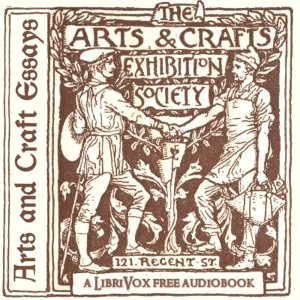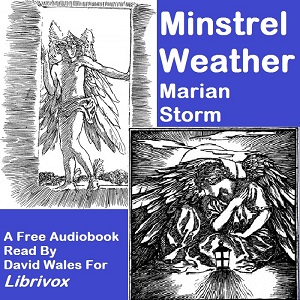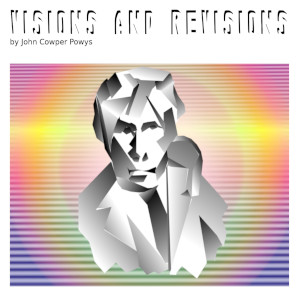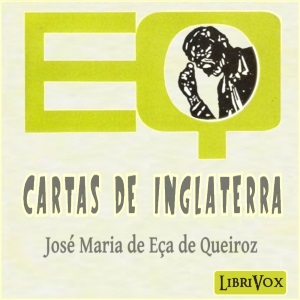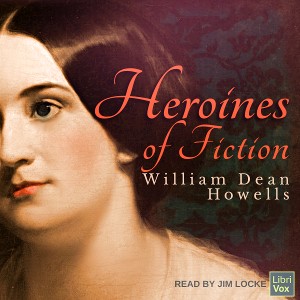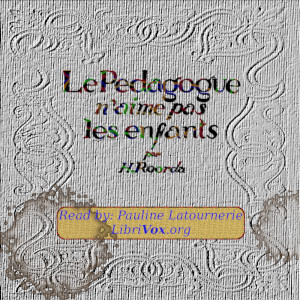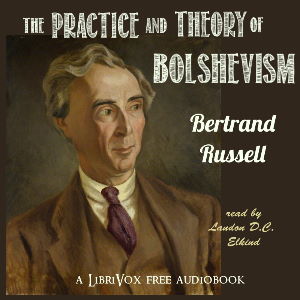Lafcadio Hearn was one of the first Westerners to live in Japan during the early Meiji era, and a prolific writer. Although chiefly known for his collections of Japanese ghost stories (in particular Kwaidan), he also wrote many non-fiction essays about his life in Japan.
This book contains 11 essays covering a variety of topics. For example, Hearn writes about his visits to Kyoto and Osaka, Japanese art, as well as Buddhism and Nirvana. (Summary by Availle)
Prooflisteners for this book were Isana and Margot.
14 episodes
This is a diverse collection of essays by English writer Max Beerbohm, whose circle included such famous men as Oscar Wilde, George Bernard Shaw, Ezra Pound, and Somerset Maugham.The essays vary considerably in character and subject. They include, among others: a spoof on the bumbling and inarticulate nature of oratory in the House of Commons; a discussion of the writings of James Whistler, the impressionist painter (which Beerbohm considers widely neglected and under-rated); a humorous consideration of why the King of England should make a royal visit to Switzerland; and a description of the delights of frequent attendance at British courts of justice.The author was among England's best known artists; Section Twenty-Two contains humorous (as well as critical) discussions of nine works of art, including paintings by Reubens, Corot, and Bellini.
- Summary by Kirsten Wever
22 episodes
Alice Meynell was an English essayist, critic, and poet who was also a leading suffragist, serving as vice-president of the Women Writers' Suffrage League, She and her husband Wilfrid Meynell were active in publishing and editing literary works including helping to launch the first works of Francis Thompson, author of "Hound of Heaven." This is a collection of her essays on children. The opening line for the first essay sets the stage. "To attend to a living child is to be baffled in your humour, disappointed of your pathos, and set freshly free from all the pre-occupations. You cannot anticipate him." - Summary by Larry Wilson
18 episodes
A series of essays by Members of the Arts and Crafts Exhibition Society with a preface by William Morris who writes "It is this conscious cultivation of art and the attempt to interest the public in it which the Arts and Crafts Exhibition Society has set itself to help, by calling special attention to that really most important side of art, the decoration of utilities by furnishing them with genuine artistic finish in place of trade finish." The Arts and Crafts Exhibition Society was formed in London in 1887 to promote the exhibition of decorative arts alongside fine arts. - Summary by J. M. Smallheer
35 episodes
A series of poetically written meditations on the seasons and other nature subjects. Or “ …Minstrel Weather, a series of open-air vignettes which circle the zodiac with the attentive eye of a naturalist and the enchanted ardor of a poet.” - Summary by Christopher Morley, Modern Essays, 1921, and David Wales
6 episodes
Alice Meynell was an English essayist, critic, and poet who was also a leading suffragist, serving as vice-president of the Women Writers' Suffrage League. She and her husband Wilfrid Meynell were active in publishing and editing literary works including helping to launch the first works of Francis Thompson, author of "Hound of Heaven." This is a collection of her essays covering a wide range of topics from the opening essay on the "Spirit of Place" to a playful essay about the foot, and musing on topics such as rain, the horizon and the concluding essay, "Shadows." - Summary by Larry Wilson
17 episodes

Early in his life Samuel Butler began to carry a note-book and to write down in it anything he wanted to remember; it might be something he heard some one say, more commonly it was something he said himself. In one of these notes he gives a reason for making them:“One’s thoughts fly so fast that one must shoot them; it is no use trying to put salt on their tails.”So he bagged as many as he could hit and preserved them, re-written on loose sheets of paper which constituted a sort of museum stored with the wise, beautiful, and strange creatures that were continually winging their way across the field of his vision. As he became a more expert marksman his collection increased and his museum grew so crowded that he wanted a catalogue. In 1874 he started an index, and this led to his reconsidering the notes, destroying those that he remembered having used in his published books and re-writing the remainder. The re-writing shortened some but it lengthened others and suggested so many new ones that the index was soon of little use and there seemed to be no finality about it. In 1891 he attached the problem afresh and made it a rule to spend an hour every morning re-editing his notes and keeping his index up to date. At his death, in 1902, he left five bound volumes, with the contents dated and indexed, about 225 pages of closely written sermon paper to each volume, and more than enough unbound and unindexed sheets to made a sixth volume of equal size. - Summary by Henry Festing Jones
33 episodes
Powys presents a set of literary devotions of great figures in Literature who have obsessed him. He attempts not so much a reasoned critique or any attempt to categorise these figures but rather, as he describes in the Preface: "to give [himself] up, absolutely and completely, to the various visions and temperaments of these great dead artists." Powys delivered popular lectures throughout the United States and was able to hold audiences in rapt attention for hours while speaking about great literature and writers, this book from the earlier part of his writing career gives us a little glimpse into what those lectures must have been like. - Summary by Keri Ford
19 episodes
A selection of short works about Christmas. (Summary by david wales)
11 episodes

Endymion is the largest work by John Keats and was composed between April and November 1817. When it was published in April 1818 the critical reception was almost universally hostile. Since that time, many readers have found the poem dense and inaccessible, and have preferred to focus on the occasional gems of poetic commentary for which it has become famous.
Feeling that the poem was both undervalued and misunderstood, in 1919 Professor Clement Notcutt published a lengthy essay, which could be considered a “user’s guide” to Endymion. He sums up his intent in the introduction:
A careful study of Endymion made some ten years ago led to the conclusion that there was more of allegorical significance in the poem than had hitherto been recognised, but the effort to trace that significance was only partially successful. Further study since that time has gradually opened up the way to the interpretation that is worked out in the following pages. It is probable that there are details in the story the meaning of which still lies hidden, but it may at least be hoped that enough has been discovered to win for the poem its rightful place among the not very numerous examples in English poetry of well-wrought allegory.
In 1921 Notcutt published a further essay entitled: The Story of Glaucus in Keat’s Endymion.
- Summary by Algy Pug
6 episodes
Seventeen short nonfiction works in the public domain, independently chosen by the readers. Topics include Nature and Science--fall scenery, rose oil, large type books for low vision, the pulmotor, and the method of scientific investigation; Philosophy and Thought--Joseph Priestly, Kierkegaard, Rousseau, and A.C. Bradley on poetry; History and Travel--John Johnston founder of Sault St. Marie, eating in Berlin, and Sir John Mandeville's travels; a Japanese folk tale; a defense of Lady Bryon by Harriet Beecher Stowe, and a Virginia slave narrative by Minnie Fulkes. (Summary by Sue Anderson)"Preparation for a Christian Life" was translated by Lee M. Hollander.
17 episodes
Alice Meynell was an English essayist, critic, and poet who was also a leading suffragist, serving as vice-president of the Women Writers' Suffrage League, She and her husband Wilfrid Meynell were active in publishing and editing literary works including helping to launch the first works of Francis Thompson, author of "Hound of Heaven." The Meynell's later converted to Roman Catholicism. These essays are very evocative for anyone who has, or wants to visit London, capturing the atmosphere of the late nineteenth century In "Ceres' Runaway," she covers topics ranging through travel, literature and children. - Summary by Larry Wilson
21 episodes
The second volume of essays and observations From the Easy Chair of William Curtis, editor of Harper's Weekly and one of the founders of the American Republican party, and served Ulysses S. Grant; although he split from the party in the 1880s over the choice of presidential candidate. He was an original member of the New York Board of Education. - Summary by Lynne Thompson
30 episodes
The third volume of essays and observations From the Easy Chair of William Curtis, editor of Harper's Weekly and one of the founders of the American Republican party, and served Ulysses S. Grant; although he split from the party in the 1880s over the choice of presidential candidate. He was an original member of the New York Board of Education. ( Lynne Thompson)
26 episodes
Sixteen short nonfiction works in the public domain, independently chosen by the readers. Topics include Science and Exploration--a tribute to Egyptologist Amelia Edwards, and discourses on gravitation and relativity by Georges-Louis Le Sage and Ralph Sampson; Sociology and Society--Julio Guerrero on the Mexican character, reflections on life from Kierkegaard's Diapsalmata, Immanuel Kant on religious education, the fate of romance in the King of Siam's harem, nickelodeons, and the tragic results of an 1851 fire on small businesses in New York's Bowery; Nature--how weeds spread, animal coloration, and mountaineering in the Rockies; as well as a biography of Buster Keaton, and a treatise on British hat making in the age of Top Hats with styles named the Bang-Up and the Vis-a-Vis. (summary by Sue Anderson)
16 episodes
Diese Sammlung umfasst 10 deutschsprachige Prosa-Texte verschiedener Genres.
Eine Liste weiterer kurzer Aufnahmen (Erzählungen, Gedichte, Märchen, Essays) in anderen LibriVox Sammlungen gibt es hier.
10 episodes
This book was called Nachala i Kontzy when first published in 1908 in Russian and has been titled Anton Tchekhov and other essays as well as Penultimate Words in English when published in 1916. Lev Shestov, like Soren Kierkegaard before him, liked to ask questions. He asks if its possible to disentangle the hidden meaning of Tchekhov's works. If Dostoevsky is doomed eternally to be 'on the eve'. What if every possibility should have been exhausted, and endless repetition should begin? He discusses writers and philosophers such as Schopenhauer, Ibsen, Dostoevsky, Kant, and the ancient Greek philosophers in this book. Shestov has been called a Christian philosopher who philosophized with all his being. (by Craig Campbell)
16 episodes
The Atlantic was a popular periodical with a wide range of essays and stories. In an effort to remain current, many strong and valid submissions ended up being pushed aside. The Atlantic Classic was an experimental publication, drawing on some sixteen of these good but rejected essays. - Summary by Lynne Thompson
18 episodes
From the pen of the Irish poet and essayist, Robert Lynd, comes a collection of humorous and satirical essays on topics as wide ranging as cats and weed to why we hate insects and morals of beans. - Summary by Larry Wilson
26 episodes
This is a volume of essays by American author Brander Matthews. Matthews is today mostly remembered for his short pieces of speculative fiction, but his essays are also of enduring interest. This volume contains 15 essays on different topics, ranging from contemporary history (1922) over literature to philosophy. They are written in a very accessible style and will interest readers and listeners today as much as they must have interested readers when the book was published in 1922. - Summary by Carolin
15 episodes
Mabel Elizabeth Wotton, an author herself, moved in the literary circles of the late nineteenth century establishing many close friendships, She presents for us here, not literary criticism nor biographical sketches, but "word portraits," shore vignettes of a persons physical appearance and elements of behavior or personality. These are all drawn from many sources -- biographies, newspapers, or personal friends of the authors. Some descriptions are based on paintings or drawings, but the majority are derived from personal acquaintance. Thus, we have a unique view of these famous artists that we seldom read. - Summary by Larry Wilson
116 episodes
Thinking she would be ill for the rest of her life, Harriet Martineau wrote these partly autobiographical essays about life in the sickroom. Considered ground breaking, it asserted that the sickroom is the sick person's place and not the doctor's. Sick people were able and willing to decide what is best for them. In England and abroad, people declared that "a sick person cannot write a healthy book" and that Harriet Martineau was definitely out of her senses. It would be interesting to see how much has changed. - Summary by Stav Nisser and Wikipedia.
10 episodes
Born in rural Vermont in 1833, and nearly unknown to today's readers, Rowland Evans Robinson was once one of Vermont's best-known writers. A talented artist, he drew cartoons in New York City for the “funny papers" before returning to Vermont, where he authored nearly a dozen widely-read books on nature and rural farm life. Poor vision progressed to blindness between the ages of 44 and 60, yet he continued to write with the aid of his wife, Anna. This collection of short essays follows New England's changing seasons and moods in all its natural beauty. - Summary by Nemo
57 episodes
Mencken sharpens his pen and in a collection of short essays delivers acerbic opinions on issues and persons of the time. Among his targets in this volume (the first of six) are critics, H.G. Wells Thorstein Veblen, Arnold Bennett, William Dean Howells, Irvin S. Cobb. Mencken's critiques are delivered against a background of his own well known ethnic, racial, religious, and sectional prejudices. (It is said that the only thing Mencken loved about the Southern United States was his wife, who hailed from Alabama.) Not for the faint of heart, Mencken's prickly, yet unapologetic, prose reveals a window into American attitudes at the time they were written and their influences on the larger American culture. - Summary by DrPGould
21 episodes
Eça de Queirós (1845-1900), um dos mais importantes escritores portugueses da história, destacou-se pelos romances Os Maias e O Crime do Padre Amaro.
Cartas da Inglaterra, de 1905, resultou do período em que viveu e trabalhou em Newcastle e Bristol no serviço consular. A obra, pouco conhecida do grande público, apresenta uma faceta política do autor, expondo sua visão analítica e ensaísta. Nela, Eça tece críticas aos acontecimentos contemporâneos, tanto no que se refere aos portugueses quanto aos estrangeiros. Os destaques icluem as festividades na Inglaterra, sugestões de livros, ideias controversas acerca da situação judaica e o comportamento do povo inglês diante de outras nações. - Summary by Adriana Sacciotto
18 episodes
An example of one of the leading literary magazines of the early 20th Century. Poetry by e.e. cummings and Louise Bryant (aka Mrs. John Reed, of "Reds" fame), a short story by Sherwood Anderson, a memoir of the late poet James Flecker, theater and book reviews by Gilbert Seldes, and other critical works. (Summary by Matt Pierard)
21 episodes
“[these essays on Shakespeare, Pepys, Restoration novels, and bohemianism]—the results of many hours of quiet but rather aimless browsing among books, and not of special investigations, undertaken with a view to definite scholastic ends. They are, moreover, as will readily be seen, completely unacademic in style and intention.” Published in 1897. Hudson (1841-1922) was a prolific author, naturalist, and ornithologist. His most popular book in the early 20th century was Green Mansions.
9 episodes
This two-volume work includes heroines from the works of Eliot, Trollope, Hardy, Harte, Austen, Edgeworth, Scott, Dickens, Hawthorne, E. Bronte, Thackeray, and others. These studies of nineteenth-century literature were by a critical light of the time. (Summary by Jim Locke)
38 episodes
From the pen of the Irish poet and essayist, Robert Lynd, comes a collection of humorous and satirical essays on topics as wide ranging as stupidity, Christmas, spring fashions, and the beauty of statistics. - Summary by Larry Wilson
28 episodes

Fifteen short nonfiction works in the public domain, independently chosen by the readers. Natural cataclysm is the subject of several readings: the 1899 Alaskan earthquake, which uplifted cliffs at Yakutat Bay 47 feet; a terrifying forest fire in Northern Wisconsin in 1899; the fiery sunsets which followed the volcanic eruption of Krakatoa in 1883; a storm at sea which sank the English frigate Anson in 1807; and the explosion of a hydrogen-filled dirigible over Chicago in 1919. Natural beauty, also a topic, includes a guide to the Antrim coast of Ireland, observations on Black Walnut trees and the communal life of Yellow-Jacket wasps, and an essay on how to paint reflections. Two colloquies of Erasmus explore a young woman's choice to become a nun and the "preposterous judgments" of people who value the names of things more than the Things themselves. Progress--envisioned as the age of electricity; changes in burglary; and Nostradamus' prognostications for the future round out the volume. -summary by Sue Anderson
Elizabeth G. Peckham was the co-author of "Communal Life of Yellow-Jacket Wasps"
Fifty Quatrains of Nostradamus was translated by Theophilus de Garencières
15 episodes
Mary Webb was a novelist and poet and two of her novels "Gone to Earth" and "Precious Bane" have been successfully adapted for film and television. She was passionate about nature and particularly the Shropshire countryside where she grew up and spent much of her life. At the age of 20, she was diagnosed with the autoimmune disease known as Graves' disease, a thyroid condition. She was often confined to her bed but came to believe that her love of and connection with nature helped in her healing.
"The Spring of Joy: A Little Book of Healing" published in 1917 is a collection of essays which celebrate the natural world with poetic and descriptive brilliance. It was actually written some years earlier while she was recovering from her first bout of illness.
Her dedication for the book reads:
TO THE WEARY AND WOUNDED
IN THE BATTLE OF LIFE
THIS LITTLE BOOK IS LOVINGLY DEDICATED
- Summary by Noel Badrian
9 episodes
From the pen of the Irish poet and essayist, Robert Lynd, comes a collection of humorous and satirical essay on the literary scene of his day with critiques of poets and and poetry, ranging from Pepys to Walter de la Mare. He even examines criticism itself. - Summary by Larry Wilson
41 episodes
Although best known for his works of science fiction, social commentary and history, H.G. Wells here gives us humorous and light-hearted pieces on a wide variety of intriguing topics from chess to death. Each essay is a gem of wit and delight. - Summary by Larry Wilson
39 episodes

Sixteen short nonfiction works in the public domain, independently chosen by the readers. Volume 59 contains an eclectic mix of readings, ranging from a description of a Coney Island elephant colossus to meditations on mental telepathy and baseball. Philosophical essays by Leibniz, Kierkegaard, Schopenhauer, Francis Bacon and William Blake touch on the topics of truth, prejudice, poetic genius, suicide, and preparation for a Christian life. An educator at a women's college in the early 1920's bemoans the decline in the way high school girls dress for school and recommends a "serge jumper dress, made with a washable under blouse." In the same span of years, a female reporter, going undercover to research conditions in the Detroit House of Corrections has herself arrested and is "stripped to the skin and searched for narcotics" and then made to don prison garb: "a faded gingham coverall, prison-made and drab." A medical doctor, writing in the 1870's, examines the connection between clean living and longevity, while a historian discusses how slave labor was employed in the salines of Southern Illinois. Native American Indian speech patterns are explored in an essay on the evolution of language, while a a chapter from a children's science book explains what happens "when the dew falls." Lastly, a spirited defense of the Bodleian as a research institution rather than a circulating library rounds out this volume of the nonfiction collection.
Preparation for a Christian Life III was translated by Lee M. Hollander.
16 episodes

Diese Sammlungsreihe erscheint unregelmäßig und umfasst 10 verschiedene deutschsprachige Prosatexte. Sie finden weitere "Folgen" der Sammlungen kurzer deutscher Prosa hier.
Die Texte wurden von LibriVox-Freiwilligen selbst (nach ihrem Interesse und Geschmack) ausgewählt und können fiktive und nicht-fiktive Inhalte behandeln.
Die Voraussetzung für die Aufnahme in diese Sammlung ist, dass alle Urheberrechte (soweit bekannt) abgelaufen sind - die Lesevorlagen und Audiobeiträge sind gemeinfrei und in der Public Domain.
Wegen diesen Grundlagen muss man sich auch bewusst sein, dass keiner der eventuell vorkommenden Sachtexte den wissenschaftlichen Status quo darstellt!
Sämtliche Inhalte können in Stimmung, Erörterungsweise, durch den "zufälligen Charakter" und die jeweilige historische Epoche stark variieren und sich von "modernen" Sichtweisen und Darstellungsweisen unterscheiden.
Dafür findet man in diesen Sammlungen auch so manchen kulturellen "Schatz", nachdenklich machende Beiträge, historisch Interessantes und Autoren, die im Allgemeinen in Vergessenheit geraten sind.
Anmerkung: Für Jugendliche, instabile Gemüter und Menschen in kritischen Lebenssituationen gibt es bei manchen Texten eventuell Gesprächsbedarf! Bitte kontaktieren Sie Bekannte oder Familienmitglieder und nehmen Sie (für Sie passende) Hilfsangebote in Anspruch!
10 episodes
Thirty four whimsical, tongue-in-cheek, and entertaining essays about not much in particular, published in 1902, by one of the most popular writers of the late nineteenth and early twentieth centuries. The American Gelett Burgess (1866-1951) was an artist, art critic, poet, author, and humorist. Nonsense verse (none in this collection) was a specialty. - Summary by David Wales
18 episodes
Friendship. Old Age. Marcus Tullius Cicero (106 BC - 43 BC) was a Roman statesman, orator, lawyer, and philosopher. He is considered one of Rome’s greatest orators and prose stylists. One commentator has written, “The influence of Cicero upon the history of European literature and ideas greatly exceeds that of any other prose writer in any language.” - Summary by David Wales
5 episodes
A Collection of 31 essays from G.K. Chesterton.
“I have strung these things together on a slight enough thread; but as the things themselves are slight, it is possible that the thread (and the metaphor) may manage to hang together. These notes range over very variegated topics and in many cases were made at very different times. They concern all sorts of things from lady barristers to cave-men, and from psycho-analysis to free verse. Yet they have this amount of unity in their wandering, that they all imply that it is only a more traditional spirit that is truly able to wander.” (From the Introduction)
31 episodes
In this collection of 17 short essays, Charles S. Brooks (1878-1934), with the usual panache and wit, which he also displays in his comedies, describes funny incidents that can happen to people on holidays or in everyday life.
His two "frightful" comedies, "Wappin' Wharf" and "At the Sign of the Greedy Pig", are already in our catalogue as full-cast stage plays. (Summary by Sonia)
17 episodes
A collection of 35 essays by G.K. Chesterton originally published in his weekly columns in "The Illustrated London News" and the "New Witness". The subjects vary greatly from lamp posts to Jane Austen's Emma, from "On Pigs as Pets" to Mormonism and Christian Science. (Summary by Maria Therese)
35 episodes
A delightful collection of stories and poems, with several interesting selections discussing various Christmas and holiday traditions, and a lovely Christmas play, featuring a full cast. All selections have been chosen and narrated by LibriVox volunteers to commemorate Christmas 2018.
Cast of Ola, or A Christmas Present for Mother:
Alta Good: Devorah AllenHenry Good: TJ BurnsLeon Good: Tomas PeterMrs. Good: FoonOla: Jasmin SalmaNarrator: Maria Kasper
23 episodes
Dans cet essai publié en 1917, Henri Roorda (1870-1925) fait une critique de la pédagogie scolaire, tout à la fois joyeusement grinçante, mélancolique, lyrique, constructive... libertaire. Son propos reste d'une grande actualité, à plus de cent ans de distance. (summary by PetitPoiSon)
10 episodes

Comme l'indique le titre, ce sont différents pensées de l'auteur, sur la vie, l'être humain, aussi la vie politique, avec deux textes, "De la Monarchie selon la Charte", et "Réflexions politiques". Chateaubriand, homme de lettres si talentueux et homme politique, Pair de France, fut un très ardent défenseur de la liberté d'expression, de la monarchie représentative et de la Charte constitutionnelle du 4 juin 1814.
Louis XVIII souhaitait rassembler les Français, bonapartistes, républicains et nostalgiques de l'Ancien régime.
Puis il y eut les "Cent-jours", en 1815.>
Louis XVIII est réfugié à Gand, puis rentre et la Seconde Restauration est établie.
Son neveu, le Duc de Berry, est assassiné en 1820.
Voir, à ce sujet, le livre audio : "Mémoires, lettres et pièces authentiques touchant la vie et la mort du Duc de Berry", de François-René de Chateaubriand, très intéressant, documenté, sur le plan de l'Histoire de France.
Ces deux Livres audio se complètent.
La nature a aussi sa place, ici, avec le joli recueil de dix poésies: "Tableaux de la nature".
- "Nous verrons" est un poème ironique, sur le temps, l’humain, et la politique, les gazettes…
- "Les Tombeaux champêtres" sont une élégie imitée de Gray, 1796, Londres. L'auteur y fut en exil.
Suivent des textes poétiques:
- sur la Révolution, la profanation des tombes royales de la basilique Saint-Denis, Napoléon, Condé et son descendant, le jeune Duc d'Enghien mort en 1804 exécuté dans les fossés de Vincennes, choc absolument intense pour les Monarchistes, écrit en 1812;
- en hommage à la Reine de Prusse, méprisée par Napoléon, écrit à Berlin en 1821;
- "Les Alpes ou l'Italie" écrit en 1822, la vie de l'auteur;
- "Le Départ", Paris 1827, souvenirs de ses voyages et la fin de la vie.
Ceci pour clore cette Compilation consacrée à F.-R. de Chateaubriand. - Summary by ChristianeJehanne
27 episodes
This book records Bertrand Russell's impressions of the new regime after a 1920 visit to Russia following the 1917 Bolshevik Revolution, including his meetings with Lenin, Trostky, and Gorky. It includes a chapter that was authored by Dora Black, educational theorist and feminist author, and Russell's spouse. This chapter was unfortunately removed in the second edition, which was issued after Dora and Bertrand divorced. This recording is dedicated to my darling wife, Jill. Happy Hanukkah and Happy 2020! - Summary by Landon D. C. Elkind
17 episodes
Mark Twain (Samuel Clemens) and William Dean Howells were friends for 44 years. Their personal and professional relationship is considered by many to be one of the most important in American literature. Howells published his famous "My Mark Twain" in the same year Clemens died, 1910. A few years earlier, Clemens wrote this "remembrance" and "appreciation" of the man who stuck with him through the ups and downs of his long literary journey. (John Greenman)
26 episodes

Twenty short nonfiction works chosen by the readers. "Why Women Should Vote" (Jane Addams, 1910) is one of several selections devoted to women's interests, as are Martha Foote Crow's "The Young Woman on the Farm" (1910), Alice Freeman Palmer's "Three Rules for Happiness," and Myrtle Reed's recipes for "Coffee Cakes, Doughnuts, and Waffles." Tradition and belief are treated in two selections from Kierkegaard, a letter from Japan ("When the Dead Return"), a creation myth ("Sky Weds Earth"), and an essay by Mark Twain on "Mental Telegraphy." Topics in history and political theory include "The Original Draft of the Declaration of Independence," "An Audience with Abraham Lincoln," "Government" (Bastiat), "Constitutional Law" (Bentham), "War Scenes Across the Canadian Border " (1915), "Americans Lose Men in Fight in Siberia" (1919) and "Quentin Roosevelt's Last Letter Home" (1918). Sport receives its due with a history of the bicycle, while "In the Land of the Wild Yak" portrays the hardships endured by 19th century explorer Sven Hedin. Finally, "Mr. NAMIKAWA Yasuyuki's Cloisonné" celebrates the life of a Japanese artist and his exquisite enamel work. - Summary by Sue Anderson
20 episodes

Twenty short nonfiction works chosen by the readers. Two U.S. Presidents are remembered in "A Colored Man's Reminiscences of James Madison" and Washington's "Address to Congress on Resigning His Commission (1783)." Other topics in history and political theory include two of George W. Ball's memos about the Vietnam War from 1965, "Irish Marriage Rites," "Celts and Celtophiles," Kropotkin on "Anarchism in Socialistic Evolution," a tragedy at sea ("The Titanic"), and a look back at "The Passing of the Sailing Ship." Religion and philosophy are represented with two selections from Kierkegaard's "Preparation for a Christian Life" and a sermon by Spurgeon ("Glorious Predestination"). Biographies pay homage to the mathematical genius Srinivasa Ramanujan. How-to and guidance readings include farming advice from George Washington Carver ("Help for Hard Times"), "Teaching Mathematics with Paper Folding," "Sexual Neuroses," and "Elementary Lessons in Cookery." "The Common Milkweed" celebrates one of summer's roadside flowers. Finally Richard de Bury pens a tribute to books in a selection from the Philobiblon, written in 1345. Summary by Sue AndersonSelections from Kierkegaard were translated by Lee M. Hollander
That the Treasure of Wisdom is Chiefly Contained in Books was translated by E.C. Thomas
20 episodes
A collection of essays regarding the pros and cons of prohibition of alcoholic beverages, principally in the United States. - Summary by KevinS
10 episodes

Twenty short nonfiction works in the public domain. "The Regulation of Time"
and "Uniform Standard Time" are two of several readings which touch on social
regulation, societal norms, and individual expression. Others examine dancing mania
("Choreomania"); gender conformity ("A Mormon Strategy"); race laws ("Black Code of
Illinois"); etiquette and social class ("Housekeeping at the White House (1903)"; "Opportunity" (a view by Ambrose Bierce); organized religion ("The Church in Liverpool in the Early 1800s"); oratory and persuasion ("Pliny to Cerealis" and "The Martians"); legal protection for original ideas ("Copyright for a banana costume"); and an exhortation to judge men by their deeds, not their names ("First Apology of Justin Martyr"). Music and books are celebrated in "Fidelio;" "The Function of a National Library;" "Books in the Wilderness;" and Oscar Wilde's "To Read or Not to Read." Natural science is represented by "Coral and Coral Reefs" and "Making a Rock Garden." Finally, a fateful communique is examined in the "Zimmermann Telegram." Summary by Sue Anderson
Pliny to Cerealis: Letter XXIV was translated by William Melmoth
20 episodes

"It seemed as if a total dissolution of nature was taking place" is the way 15-year old Alexander Hamilton described living through a hurricane ("The West Indian Hurricane of 1772"). Other natural and man-made disasters chronicled in vol. 069 are "The Eruption of Mt. Asama of 1783," "The Great Chicago Fire," and "The Siege of Nicaea (1096-1097)." Society and social reform are treated from a variety of viewpoints: "Tatlings: Epigrams (1922)," "Wooed a 'Marjorie Daw' for 14 Years," Petty Management" (Florence Nightingale), "The Public Schools of Today," "What a Colored Man Should Do to Vote," "Patriotism and Government" (Tolstoy), the "Prison Journal of Stephen F. Austin," and Fichte's "My Will is Mine." Books and reading are given their due in "Women Writers of the 17th and 18th Centuries," "The Art of Reading," and Benchley's humorous "The Most Popular Book of the Month." The tenets of Calvinism are explained in a short essay. Oliver Goldsmith presents his novel theory about the origin of marine fossils found on dry land. Listeners are introduced to the exploits of San Francisco resident Joshua Norton, who proclaimed himself "Norton I, Emperor of the United States." And, finally, an essay on "The Art of Packing" dating from the era of steamer trunks should bring a smile to today's backpack and roller bag travelers. Summary by Sue Anderson
20 episodes



